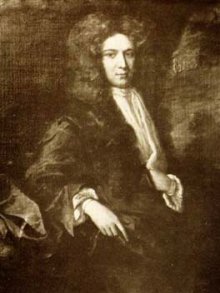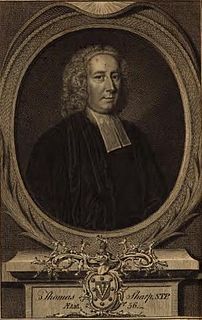Related Research Articles

Anthony Collins was an English philosopher, and a proponent of deism.

A Chubb detector lock is a type of lever tumbler lock with an integral security feature, a form of relocker, which frustrates unauthorised access attempts and indicates to the lock's owner that it has been interfered with. When someone tries to pick the lock or to open it using the wrong key, the lock is designed to jam in a locked state until either a special regulator key or the original key is inserted and turned in a different direction. This alerts the owner to the fact that the lock has been tampered with.

Samuel Chandler was a British Nonconformist minister and polemicist pamphleteer. He has been called the 'uncrowned patriarch of Dissent' in the latter part of George II's reign.

Edward Stillingfleet was a British theologian and scholar. Considered an outstanding preacher as well as a strong polemical writer defending Anglicanism, Stillingfleet was known as "the beauty of holiness" for his good looks in the pulpit, and was called by John Hough "the ablest man of his time".

An Essay on Man is a poem published by Alexander Pope in 1733–1734. It was dedicated to Henry St John, 1st Viscount Bolingbroke, hence the opening line: "Awake, St John...". It is an effort to rationalize or rather "vindicate the ways of God to man" (l.16), a variation of John Milton's claim in the opening lines of Paradise Lost, that he will "justify the ways of God to men" (1.26). It is concerned with the natural order God has decreed for man. Because man cannot know God's purposes, he cannot complain about his position in the Great Chain of Being (ll.33-34) and must accept that "Whatever IS, is RIGHT" (l.292), a theme that was satirized by Voltaire in Candide (1759). More than any other work, it popularized optimistic philosophy throughout England and the rest of Europe.
William Webster (1689–1758) was a British priest in the Church of England and a theological writer.
Thomas Morgan was an English deist.
Nationality words link to articles with information on the nation's poetry or literature.
Samuel Bold (1649–1737) was an English clergyman and controversialist, a supporter of the arguments of John Locke for religious toleration.
Arthur Ashley Sykes (1684–1756) was an Anglican religious writer, known as an inveterate controversialist. Sykes was a latitudinarian of the school of Benjamin Hoadly, and a friend and student of Isaac Newton.
Thomas Bennet (1673–1728) was an English clergyman, known for controversial and polemical writings, and as a Hebraist.
Samuel Fancourt (1678–1768) was a dissenting minister and projector of circulating libraries. He is said to have been a native of Hungerford, in Berkshire, England.
Moses Lowman (1680–1752) was an English nonconformist minister, known as a Biblical commentator.
Thomas Rutherforth (1712–1771) was an English churchman and academic, Regius Professor of Divinity at Cambridge from 1745, and Archdeacon of Essex from 1752.
Resistance theory is an aspect of political thought, discussing the basis on which constituted authority may be resisted, by individuals or groups. In the European context it came to prominence as a consequence of the religious divisions in the early modern period that followed the Protestant Reformation. Resistance theories could justify disobedience on religious grounds to monarchs, and were significant in European national politics and international relations in the century leading up to the Peace of Westphalia of 1648. They can also underpin and justify the concept of revolution as now understood. The resistance theory of the early modern period can be considered to predate the formulations of natural and legal rights of citizens, and to co-exist with considerations of natural law.

John Jackson (1686–1763) was an English clergyman, known as a controversial theological writer.

Thomas Sharp (1693–1758) was an English churchman, known as a biographer and theological writer, archdeacon of Northumberland from 1723.
John Hildrop was an English cleric, known as a religious writer and essayist. Hildrop authored one of the earliest works on animal rights.
References
- 1 2 Foster, Joseph (18 April 1887). "Alumni Oxonienses: the Members of the University of Oxford, 1715-1886: Their Parentage, Birthplace, and Year of Birth, with a Record of Their Degrees: Being the Matriculation Register of the University, Alphabetically Arranged, Revised and Annotated". Parker and Company. Retrieved 18 April 2019– via Google Books.
- ↑ "Person: Bliss, Antony (1720 - 1739) CCEd Person ID: 17879". Clergy of the Church of England Database. Retrieved 29 April 2019.
- ↑ Herick, James A. (1997). The Radical Rhetoric of the English Deists: The Discourse of Skepticism, 1680–1750. University of South Carolina Press. p. 146. ISBN 9781570031663 . Retrieved 29 April 2019– via Google Books.
- ↑ Gillett, E.H. (18 April 1874). "God in Human Thought: Or, Natural Theology Traced in Literature, Ancient and Modern, to the Time of Bishop Butler". Scribner, Armstrong & Company. Retrieved 18 April 2019– via Google Books.
- ↑ "The Gentleman's Magazine, Or, Monthly Intelligencer". 2. September 1733. p. 481. Retrieved 30 April 2019– via Google Books.
- ↑ "King Charles the First". anglicanhistory.org. Retrieved 18 April 2019.
- ↑ Bliss, Anthony (18 April 2019). "A Letter in Vindication of God's Prescience of Contingencies, Upon the Principles of Reason: Against the Objections of Mr. Fancourt, in His Late Essay on Liberty, Grace, and Prescience. By Anthony Bliss, A.M. Vicar of Portsmouth". John Gray. Retrieved 18 April 2019– via Google Books.
- ↑ Bliss, Anthony (18 April 2019). "Observations on Mr. Chubb's Discourse Concerning Reason: Wherein His Attempt to Prove, that Reason Either Is, Or Ought to Be, a Sufficient Guide in Matters of Religion, is Consider'd; ... By Anthony Bliss, A.M. Vicar of Portsmouth". Samuel Wilmot, Oxford: and sold. Retrieved 18 April 2019– via Google Books.
- ↑ Horne, Thomas Hartwell (1827). "A Catalogue of the Library of the College of St. Margaret and St. Bernard, commonly called Queen's College". Queen's College, Cambridge. p. 195. Retrieved 29 April 2019– via Google Books.
- ↑ Bliss, Anthony (18 April 2019). "Calumny and Defamation Displayed: or, a Brief essay on a new theological question, viz. Whether charity be a damning heresy? In a letter to the Reverend Mr. Du-Gard ... The second edition". John Oswald. Retrieved 18 April 2019– via Google Books.
- ↑ Du-Gard, William (1735). "Calumny and Defamation Retorted: Or, Some Brief Animadversions Upon an Erroneous and Dangerous Position, Lately advanced and defended from the Press". G. Strahan. Retrieved 29 April 2019– via Google Books.
- ↑ Krause, Johann Gottlieb (30 May 1735). "Neue Zeitungen von gelehrten Sachen" [New Newspapers about Scholarly Things] (in German). Leipzig: Johann Gottlieb Krause. p. 379. Retrieved 30 April 2019– via Google Books.
| This article about a Church of England cleric is a stub. You can help Wikipedia by expanding it. |